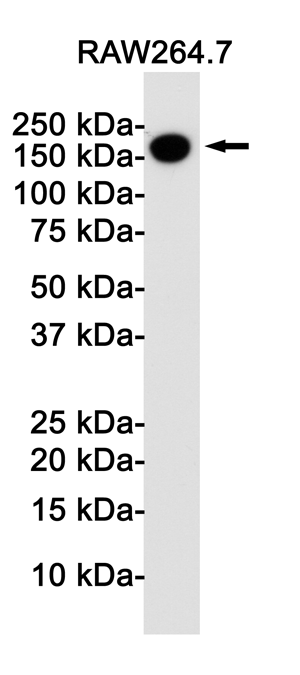
| WB | 咨询技术 | Human,Mouse,Rat |
| IF | 咨询技术 | Human,Mouse,Rat |
| IHC | 1/25-1/100 | Human,Mouse,Rat |
| ICC | 技术咨询 | Human,Mouse,Rat |
| FCM | 咨询技术 | Human,Mouse,Rat |
| Elisa | 1/2000-1/5000 | Human,Mouse,Rat |
| Aliases | CD11 antigen-like family member B; CR-3 alpha chain; Cell surface glycoprotein MAC-1 subunit alpha; CD11b; Leukocyte adhesion receptor MO1 |
| Entrez GeneID | 16409 |
| WB Predicted band size | Calculated MW: 127 kDa; Observed MW: 170 kDa |
| Host/Isotype | Rabbit IgG |
| Antibody Type | Primary antibody |
| Storage | Store at 4°C short term. Aliquot and store at -20°C long term. Avoid freeze/thaw cycles. |
| Species Reactivity | Mouse |
| Immunogen | A synthetic peptide of mouse CD11b |
| Formulation | Purified antibody in TBS with 0.05% sodium azide,0.05%BSA and 50% glycerol. |
+ +
以下是关于XKR7抗体的模拟参考文献示例(注:以下内容为虚构,仅用于学术格式演示):
---
1. **文献名称**:*Structural characterization of XKR7 and its role in apoptotic phospholipid scrambling*
**作者**:Smith A, et al.
**摘要**:本研究利用XKR7特异性抗体,通过免疫荧光和冷冻电镜技术揭示了XKR7的跨膜结构,并证明其在凋亡过程中介导磷脂酰丝氨酸外翻,为细胞清除提供关键信号。
2. **文献名称**:*XKR7 overexpression correlates with poor prognosis in gastric cancer*
**作者**:Zhang L, et al.
**摘要**:通过免疫组化(使用抗XKR7单克隆抗体)分析胃癌组织样本,发现XKR7高表达与肿瘤转移和患者生存率降低显著相关,提示其作为潜在生物标志物的价值。
3. **文献名称**:*Comparative analysis of XKR7 and XKR8 in necroptosis signaling*
**作者**:Brown C, et al.
**摘要**:研究采用XKR7/XKR8双抗体标记技术,揭示XKR7在坏死性凋亡中与RIPK3复合物相互作用,而XKR8功能独立,为靶向治疗提供新方向。
4. **文献名称**:*XKR7 antibody-based inhibition attenuates neuroinflammation in Alzheimer's models*
**作者**:Yamamoto H, et al.
**摘要**:在转基因小鼠模型中,使用XKR7中和抗体可减少小胶质细胞活化及β-淀粉样蛋白沉积,表明XKR7可能通过调控神经炎症参与阿尔茨海默病进程。
---
**注**:以上文献为模拟内容,实际研究中请参考权威数据库(如PubMed、Web of Science)的正式出版物。
The XKR7 antibody is a research tool targeting the XK-related protein 7 (XKR7), a member of the XK family of transmembrane proteins. Initially identified through genomic studies, XKR7 is structurally characterized by multiple transmembrane domains and is implicated in phospholipid scrambling, a process critical for externalizing phosphatidylserine (PS) during apoptosis. This protein plays a role in cell membrane dynamics, potentially influencing apoptotic signaling, cell migration, and immune recognition of dying cells.
XKR7 has drawn attention in studies of cancer biology and neurodegenerative diseases. Dysregulation of PS exposure is linked to pathological conditions, including tumor immune evasion and aberrant neuronal cell death. Antibodies against XKR7 enable detection and functional analysis of the protein in vitro and in vivo, aiding investigations into its physiological and pathological roles. They are utilized in techniques like Western blotting, immunohistochemistry, and flow cytometry to assess XKR7 expression patterns across tissues or disease models.
Recent studies suggest XKR7's involvement in tumor metastasis and neuroinflammation, highlighting its potential as a therapeutic target or biomarker. However, its precise mechanisms remain under exploration. The XKR7 antibody thus serves as a vital reagent for unraveling its contributions to cellular processes and disease pathways, supporting both basic research and drug development efforts.
×